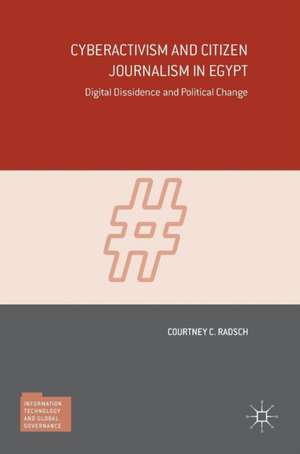Cyberactivism and Citizen Journalism in Egypt: Digital Dissidence and Political Change: Information Technology and Global Governance
Autor Courtney C. Radschen Limba Engleză Hardback – 24 sep 2016
Preț: 394.87 lei
Nou
Puncte Express: 592
Preț estimativ în valută:
75.56€ • 80.80$ • 62.100£
75.56€ • 80.80$ • 62.100£
Carte tipărită la comandă
Livrare economică 17 aprilie-01 mai
Preluare comenzi: 021 569.72.76
Specificații
ISBN-13: 9781137497895
ISBN-10: 1137497890
Pagini: 366
Ilustrații: XV, 351 p. 3 illus. in color.
Dimensiuni: 148 x 210 x 25 mm
Greutate: 0.58 kg
Ediția:1st ed. 2016
Editura: Palgrave Macmillan US
Colecția Palgrave Macmillan
Seria Information Technology and Global Governance
Locul publicării:New York, United States
ISBN-10: 1137497890
Pagini: 366
Ilustrații: XV, 351 p. 3 illus. in color.
Dimensiuni: 148 x 210 x 25 mm
Greutate: 0.58 kg
Ediția:1st ed. 2016
Editura: Palgrave Macmillan US
Colecția Palgrave Macmillan
Seria Information Technology and Global Governance
Locul publicării:New York, United States
Cuprins
1. Introduction: Cyberactivism and social movements .- 2. Embodied and virtual ethnography: doing research in the digital age .- 3. The legal regulatory dynamics of the public sphere .- 4. We the people: citizen journalism in the era of social media .- 5. Cyberactivism and egypt’s youth movement .- 6. Bloggers and believers: dynamics of activism and identity in the muslim brotherhood .- 7. Conclusion: Revolution 2.0.
Notă biografică
Courtney C. Radsch, PhD, is a researcher and journalist working at the nexus of media, technology, and human rights, and has written widely on these issues in the popular and academic press. She has held positions with The New York Times, Al Arabiya, and UNESCO and is Advocacy Director at the Committee to Protect Journalists.
Textul de pe ultima copertă
This compelling book explores how Egyptian bloggers used citizen journalism and cyberactivism to chip away at the state’s monopoly on information and recalibrate the power dynamics between an authoritarian regime and its citizens. When the Arab uprisings broke out in early 2011 and ousted entrenched leaders across the region, social media and the Internet were widely credited with playing a role, particularly when the Egyptian government shut down the Internet and mobile phone networks in an attempt to stave off the unrest there. But what these reports missed were the years of grassroots organizing, digital activism, and political awareness-raising that laid the groundwork for this revolutionary change. Radsch argues that Egyptian bloggers created new social movements using blogging and social media, often at significant personal risk, so that less than a decade after the information revolution came to Egypt they successfully mobilized the overthrow of the state and its president.
Caracteristici
Offers a comprehensive analysis of the changing nature of the media and politics in Egypt Written by an expert scholar and journalist on media, digital activism, and the Middle East An in-depth exploration and analysis of how cyber activists reshaped political contestation to empower the disenfranchised and subaltern through the use of digital and social media tools Provides a framework for understanding citizen journalism and the new media ecosystem





















